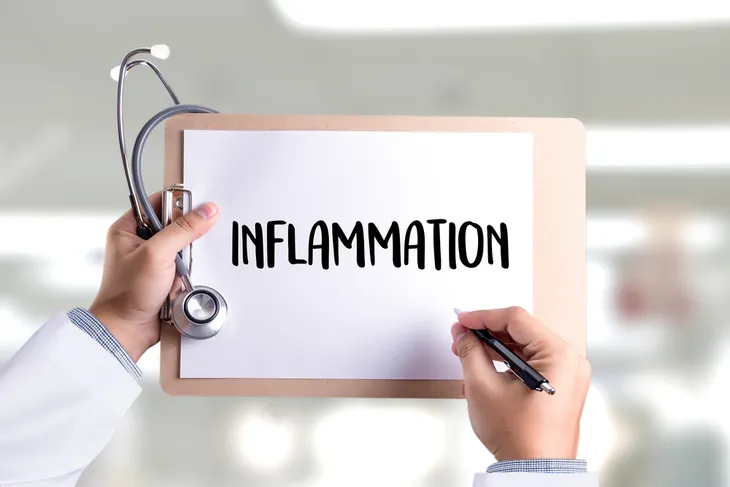- Not all inflammation is bad. Acute inflammation is a helpful short-term response that can ward off infection. Chronic inflammation, however, can wreak havoc in your body.
- Chronic inflammation can present itself in a variety of ways from muscle aches and fatigue to digestive problems and skin irritation.
- When inflammation becomes chronic, it’s vital that you get it under control to help reduce the risk of long-term damage.
Being mindful of what we eat, how much we exercise, our quality of sleep, and our stress levels are all a part of living a healthy life. But there’s another important factor you should be mindful of too. And that is, signs of chronic inflammation in your body.
It turns out chronic inflammation may increase your risk of crippling diseases like heart disease, stroke, cancer, diabetes, and obesity. This is why it’s important to know the signs of chronic inflammation and what you can do to manage it.
What Is Inflammation and How Does It Impact the Body?
Before we dive into the signs of chronic inflammation, it’s important to understand what it is and how it impacts your body. First, it’s important to establish that not all inflammation is bad. Live Strong explains that “acute inflammation is a helpful, short-term immune response that happens because of an injury or infection (like an ankle sprain or a common cold).” After you’ve recovered, the inflammation disappears.
The type of inflammation you want to be wary of is chronic inflammation. This occurs when “the immune system goes into overdrive to fend off threats and sustains this attack mode for long periods of time,” explains the source. If this occurs, chronic inflammation can start damaging healthy cells, tissues, and organs, and ultimately, wreak havoc on your body.
Signs and Symptoms of Chronic Inflammation
Healthline says when you have acute inflammation, the symptoms will usually be more noticeable, such as redness, swelling, and pain. With chronic inflammation, “symptoms are usually much more subtle,” says the source. This also makes it easy to ignore or overlook the symptoms.
The signs and symptoms of chronic inflammation can differ from person to person and they can range from mild to severe. Some common symptoms to look out for include fatigue, body aches, digestive problems, and more. Let’s take a deeper look at what these signs might entail next!
Muscle Aches and Joint Pain
One key sign of chronic inflammation is muscle aches and joint pain. Niket Sonpal, MD, a New York-based internist and gastroenterologist tells Live strong, “When inflammatory cytokines (proteins related to the immune system) are elevated in the body, they can trigger muscle soreness and swelling.”
Chronic inflammation can damage your muscle fibers which can cause muscle weakness. The source says the arteries that pass through the damaged muscles can also be affected. Furthermore, you may also experience subtle pain and stiffness in your joints that isn’t caused by an intense workout. The pain develops because inflammation can cause swelling in your joints.
Fatigue
We all have our days when we feel tired. Whether it was from an intense workout the day before or not getting enough sleep. But unexplained fatigue is a cause for concern and it might be a result of chronic inflammation.
The reason this can occur is that chronic inflammation can cause stress in your body and overstimulate your sympathetic nervous system, explains Livestrong. Eventually, the overstimulation can deplete your energy causing you to feel lethargic.
Memory and Concentration Problems
If you’re feeling more forgetful or having difficulty concentrating, it might be from chronic inflammation. While cognition naturally declines as we age, research says elevated inflammatory markers are consistently associated with a decline in memory.
The findings also found that decline can start during midlife. All the more reason to start reducing inflammation as early as possible to help prevent cognitive decline later in life.
Skin Irritation
Dealing with skin issues is never fun but if your skin problems are ongoing, it may be a sign of chronic inflammation. Livestrong says to be on the lookout for markers of chronic inflammation like redness, blisters, itchy bumps, or skin dryness.
Furthermore, Eating Well says, “Chronic inflammation is the result of the immune system being overworked and creates a low level of ongoing irritation within the body.” So, this reaction can cause your body to be hypersensitive to triggers it doesn’t normally respond to, and your body may respond with skin irritation.
Digestive Problems
Digestive problems can be a sign of a variety of conditions or even an allergy to certain foods, however, it can also be a sign of chronic inflammation. Be on the lookout for signs like bloating, constipation or diarrhea, and abdominal discomfort as these could all indicate inflammation.
One common condition caused by inflammation you should be mindful of is known as chronic gastritis. “Chronic gastritis is a long-term condition in which the mucus lined layer of the stomach, also known as the gastric mucosa, is inflamed or irritated over a longer period of time,” explains Ada Health. Chronic gastritis can develop as a result of a bacterial infection, damage to the stomach lining, or a malfunction of the immune system, says the source.
How to Reduce and Manage Chronic Inflammation
When inflammation becomes chronic, it’s vital that you get it under control to help reduce the risk of long-term damage. This is why it’s important to talk to your doctor to make a treatment plan to reduce inflammation in your body.
If you smoke, your doctor will likely advise you to quit. Medications or supplements may also be part of your treatment plan but be sure to follow the guidance of your doctor. There are other lifestyle changes you can make too such as getting enough exercise, managing your stress, and eating a healthy anti-inflammatory diet. Let’s take a closer look at some of these next.
Increase Sleep
Don’t underestimate the power of sleep. “If you’re sleeping better, your inflammation will also be reduced, and you’ll find relief from this chronic swelling,” says Sound Sleep Medical.
If you’re having trouble sleeping there are some simple tips you can follow such as sticking to a routine, limiting caffeine later in the day, creating a relaxing and inviting sleep environment, and avoiding screen time before bed. Other healthy habits include exercising during the day to help you feel more tired at night and avoiding late-night unhealthy snacks.
Decrease Stress
It’s normal to be stressed from time to time but chronic stress can play a role in inflammation in the body. This is why it’s important to learn how to manage it.
Everyday Health notes a study that found the “subjects who meditated regularly had lower levels of cortisol, as measured after a social-stress test. Meditators also had a less-pronounced inflammatory response in their bodies.” The source also notes that similar results have been linked to the regular practice of yoga. Other great ways to manage stress include journaling, breathing exercises, talking to a therapist or friend, or exercising. Find what works for you and practice it every day.
Dietary Changes
The foods we eat can play a role in inflammation too. If you suffer from chronic inflammation, it may be best to enjoy anti-inflammatory foods which are rich in antioxidants and polyphenols. Some examples include olive oil, leafy greens, fatty fish, nuts, blueberries, cherries, and oranges.
Certain foods may also contribute to inflammation. Livestrong says to “limit foods with additives and preservatives,” as well as foods with high amounts of trans fats, and saturated fats. Some examples include refined carbohydrates, fried foods, processed meat, and packaged foods. It’s important to work with your doctor to determine the best diet for you.
When to See a Doctor
Ongoing pain, swelling, fatigue, skin irritation, or digestive problems are not normal and warrant a doctor’s visit. So, if you develop any of these possible signs of chronic inflammation, you should book an appointment with your doctor.
Your doctor can perform a physical exam, review your medical history, and perform tests to help narrow down the cause. From there, they will recommend appropriate treatment options to help reduce and manage your chronic inflammation.















